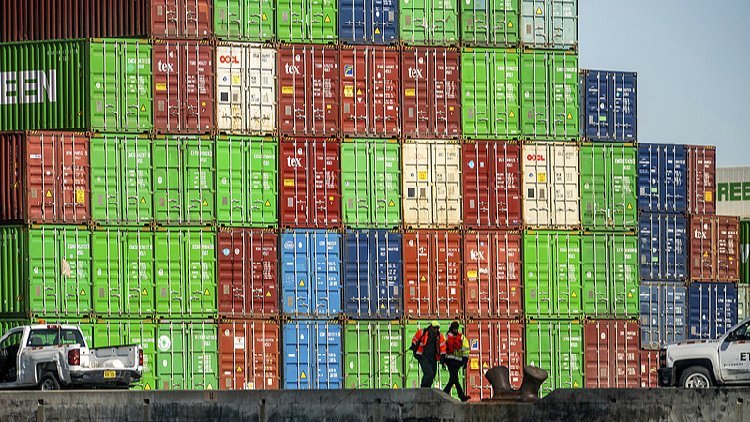Global Outcry and Market Disruption Follow U.S. Tariffs
Trump's implementation of "reciprocal tariffs" has ignited widespread global outrage, drawing criticism even from longtime allies.

Wall Street experienced one of its worst trading sessions in years, with the Nasdaq Composite slipping into bear market territory, having dropped over 20 percent from recent peaks, and the Dow Jones Industrial Average entering a correction phase. On Thursday and Friday, the Dow fell by 9.3 percent, the S&P 500 declined by 10.5 percent, and the Nasdaq dropped by 11.4 percent.
Apple, being one of the world’s largest companies by market capitalization, was among the most affected, due to its reliance on Chinese manufacturing for products like the iPhone. Other major players such as Walmart and Nike also suffered substantial losses from the new round of tariffs.
The negative impact was not limited to the U.S.; major financial markets across Asia and Europe also reported considerable losses, highlighting widespread apprehension regarding the escalating trade tensions.
The U.S. government's introduction of extensive new tariffs has faced extensive global criticism. A survey from CN revealed that an overwhelming majority of respondents think that "reciprocal tariffs" will not resolve the issues facing the U.S., but will instead harm American consumers and hinder economic growth.
In addition, several nations have accused Washington of economic intimidation, undermining established global trade norms and threatening international collaboration.
Responding swiftly, China announced retaliatory tariffs on American goods. Starting at noon on April 10, Beijing plans to impose a 34 percent tariff on selected U.S. imports. Furthermore, new export restrictions on essential rare earth elements, vital for advanced manufacturing and technology, will also take effect.
In their statement, Chinese trade officials articulated that the U.S. actions do not align with international trade regulations, severely infringe upon China's legitimate rights and interests, and exemplify unilateral bullying.
As the U.S.'s largest trading partner, the European Union quickly expressed its opposition. European Commission President Ursula von der Leyen denounced the U.S. tariffs and confirmed that the EU has completed a set of countermeasures specifically aimed at American steel exports.
Von der Leyen criticized Trump's actions as a “major blow” to the global economy, indicating that it would “massively suffer.”
"There seems to be no order in the disorder, no clear path to the complexity and chaos that is being created as all U.S. trading partners are hit," von der Leyen remarked.
She warned of “immense consequences,” asserting that the effects would be immediate, with negative repercussions for consumers and businesses worldwide.
"Uncertainty will spiral and trigger the rise of further protectionism. The consequences will be dire for millions of people around the globe, especially for the most vulnerable countries, which are now subject to some of the highest U.S. tariffs."
Traditional U.S. allies have also voiced their concerns regarding the tariffs. British Prime Minister Keir Starmer, Italian Premier Giorgia Meloni, and Australian Prime Minister Anthony Albanese all expressed disappointment with America's new tariffs, emphasizing the adverse effects of a trade war.
"The [U.S.] administration's tariffs have no basis in logic – and they go against the basis of our two nations' partnership," Albanese stated. “This is not the act of a friend.”
French President Emmanuel Macron urged European firms to pause investment plans in the United States, while Canadian Prime Minister Mark Carney warned that Canada would "take reciprocal measures" to safeguard its economy.
The international backlash suggests a potentially tumultuous phase for global trade and investment. While the U.S. administration defends the tariffs as essential for protecting domestic industries, analysts have pointed out that these actions showcase America's readiness to isolate itself from the global community.
"In fact, the international order today, which the U.S. sees as unfair, was formed under its own leadership, and it has been its biggest beneficiary for a long time," remarked Wei Nanzhi, a research fellow at the Institute of American Studies, Chinese Academy of Social Sciences.
Despite the challenges posed by the dominance of the U.S. dollar for American industrial workers, attempting to utilize "reciprocal tariffs" to stimulate a return of manufacturing to the U.S. in the short term is unrealistic, Wei noted.
Cui Fan, a professor at the University of International Business and Economics in Beijing, warned that the tariffs would heighten domestic prices in the U.S., create additional burdens for citizens, and elevate costs for many businesses.
Given the current global value chains, tariffs cannot restore manufacturing to the U.S. homeland, Cui explained.
With Trump wielding "modification authority" over tariffs, the unpredictability of this policy remains a significant factor hindering trade, with Cui predicting a grim outlook for the global trade environment in the near future.
Sanya Singh contributed to this article for TROIB News
Find more stories on Business, Economy and Finance in TROIB business












